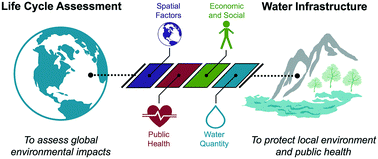当前位置:
X-MOL 学术
›
Environ. Sci.: Water Res. Technol.
›
论文详情
Our official English website, www.x-mol.net, welcomes your feedback! (Note: you will need to create a separate account there.)
Life cycle assessment (LCA) of urban water infrastructure: emerging approaches to balance objectives and inform comprehensive decision-making
Environmental Science: Water Research & Technology ( IF 5 ) Pub Date : 2017-07-26 00:00:00 , DOI: 10.1039/c7ew00175d Diana M. Byrne 1, 2, 3, 4 , Hannah A. C. Lohman 1, 2, 3, 4 , Sherri M. Cook 4, 5, 6, 7 , Gregory M. Peters 8, 9, 10, 11, 12 , Jeremy S. Guest 1, 2, 3, 4
Environmental Science: Water Research & Technology ( IF 5 ) Pub Date : 2017-07-26 00:00:00 , DOI: 10.1039/c7ew00175d Diana M. Byrne 1, 2, 3, 4 , Hannah A. C. Lohman 1, 2, 3, 4 , Sherri M. Cook 4, 5, 6, 7 , Gregory M. Peters 8, 9, 10, 11, 12 , Jeremy S. Guest 1, 2, 3, 4
Affiliation

|
Life cycle assessment (LCA) has been widely used to quantify environmental impacts associated with urban water infrastructure, including wastewater, drinking water, stormwater, and integrated urban water systems. While LCA is applicable for the estimation of global environmental impacts, decision-makers must balance these impacts with local, often regulated, environmental and public health objectives. To characterize the state of the art for the use of LCA for urban water infrastructure, a thorough literature review was conducted of papers that applied LCA to wastewater (173 papers), drinking water (44 papers), stormwater (17 papers), and integrated urban water (22 papers) systems. Analyses revealed current preferences for functional unit basis (e.g., volume for wastewater), system boundaries (e.g., focus on operation), and impact assessment methodology (CML, ReCiPe, and Eco-Indicator). Based on these findings, LCA methodological recommendations for urban water infrastructure are made, and emerging opportunities to balance objectives and inform comprehensive decision-making are discussed. Critical opportunities include the integration of spatial considerations (e.g., spatialized characterization factors), water quantity (e.g., water quantity indicators), public health (e.g., integration with risk assessment), economic and social assessments (e.g., life cycle costing and social LCA), along with prioritization of continuous stakeholder engagement. Finally, research and development needs specific to the use of LCA for urban water infrastructure (e.g., development of new indicators coupled with case studies) are prioritized.
中文翻译:

城市水基础设施的生命周期评估(LCA):平衡目标和为全面决策提供依据的新兴方法
生命周期评估(LCA)已被广泛用于量化与城市水基础设施(包括废水,饮用水,雨水和城市综合水系统)相关的环境影响。虽然LCA适用于估计全球环境影响,但决策者必须在这些影响与地方(通常是受监管的)环境和公共卫生目标之间取得平衡。为了描述将LCA用于城市水基础设施的最新技术,对将LCA应用于废水(173篇论文),饮用水(44篇论文),雨水(17篇论文)以及综合研究的论文进行了详尽的文献综述。城市供水系统(22篇论文)。分析揭示了当前对功能单元基础(例如废水量),系统边界(例如,专注于运营)和影响评估方法(CML,ReCiPe和Eco-Indicator)。基于这些发现,提出了针对城市水基础设施的LCA方法学建议,并讨论了平衡目标和为全面决策提供信息的新机会。关键机会包括空间考虑因素(例如空间特征因子),水量(例如水量指标),公共卫生(例如与风险评估的整合),经济和社会评估(例如,生命周期成本和社会LCA),以及优先考虑利益相关者持续参与的优先级。最后,优先考虑针对城市水基础设施使用LCA的研发需求(例如,开发新指标并结合案例研究)。
更新日期:2017-10-27
中文翻译:

城市水基础设施的生命周期评估(LCA):平衡目标和为全面决策提供依据的新兴方法
生命周期评估(LCA)已被广泛用于量化与城市水基础设施(包括废水,饮用水,雨水和城市综合水系统)相关的环境影响。虽然LCA适用于估计全球环境影响,但决策者必须在这些影响与地方(通常是受监管的)环境和公共卫生目标之间取得平衡。为了描述将LCA用于城市水基础设施的最新技术,对将LCA应用于废水(173篇论文),饮用水(44篇论文),雨水(17篇论文)以及综合研究的论文进行了详尽的文献综述。城市供水系统(22篇论文)。分析揭示了当前对功能单元基础(例如废水量),系统边界(例如,专注于运营)和影响评估方法(CML,ReCiPe和Eco-Indicator)。基于这些发现,提出了针对城市水基础设施的LCA方法学建议,并讨论了平衡目标和为全面决策提供信息的新机会。关键机会包括空间考虑因素(例如空间特征因子),水量(例如水量指标),公共卫生(例如与风险评估的整合),经济和社会评估(例如,生命周期成本和社会LCA),以及优先考虑利益相关者持续参与的优先级。最后,优先考虑针对城市水基础设施使用LCA的研发需求(例如,开发新指标并结合案例研究)。



























 京公网安备 11010802027423号
京公网安备 11010802027423号